- Culture
- 07 Jun 22

Wallis Bird is one of Ireland’s most brilliant – and inspiring – songwriters and performers. She also happens to be one of the country’s pioneering LGBTQI+ artists. Here, she reflects on what it was like growing up gay in small town Ireland in the 1990s, talks about the attractions of Berlin, discusses her decision not to have children and speaks openly about the accident that changed her life forever – and, arguably, put her on the road to stardom. Interview by Panti Bliss. Photography: Miguel Ruiz.
Wallis Bird moved to Germany for a hot meal. Or so she tells me anyway.
"When I got there, the thing that made me stay was that I got a hot meal before the show.”
She smiles.
"Swear to God. That was the turning point for me. You get a hot meal before the show, because they say, "At the very least, we want you to be well fed, so that you can do a proper job."
This was my first time meeting Wallis Bird (I'm going to call her Wallis Bird throughout this piece because Wallis Bird is one of those names that I like saying in full. Wallis Bird. It feels good to say it. Wallis Bird. And it's a great name for a pop star) – and if she had gotten up and left after that first question, she'd still be one of my new favourite people. Moving country for a hot meal and respect seems like a very Wexford lesbian thing to do, and I like Wexford lesbians.
Advertisement
Wallis Bird is from Wexford.
MY DAD IS A DJ!
The day she was born, family lore goes, there was an article in the paper about an auction of the "love jewellery” given to the scandalous Wallis Simpson by the Duke of Windsor (the former King Edward VIII). Wallis may have been a proto-fascist, but she had inserted herself successfully – and disruptively – into the Royal Family (not mine, the British one). But Mammy and Daddy Bird liked the name. Wallis.
She grew up in the family pub in Enniscorthy, The Gilded Cage, which "was daily craic.” The pub had snugs, a lounge, and a back room with arcade games and a pool table. Her parents had to be "psychologist, mediator, fuckin' nurse!” In a small – or even a medium – town, a pub really is the centre of community life.
She smiles again. “Everybody was treated equally as long as there was respect,” she says.
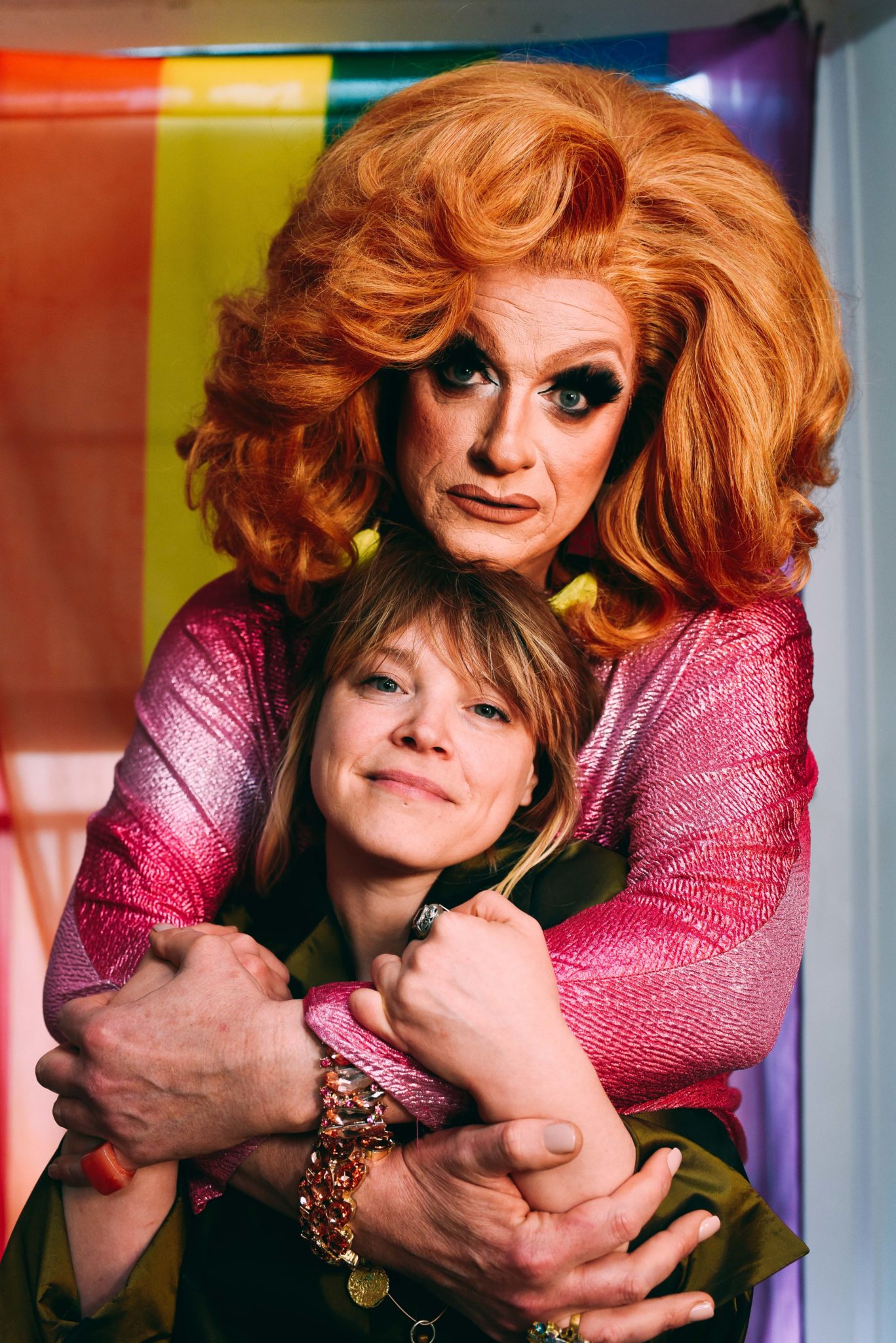 Wallis Bird and Panti Bliss. Copyright Miguel Ruiz.
Wallis Bird and Panti Bliss. Copyright Miguel Ruiz.Advertisement
Wallis Bird is very big on respect.
One of her very first gigs was in the family pub.
She did covers – "with a guy called Paul Downing” – and she remembers the moment when something slotted into place. She was just 17.
"I remember the click,” she recalls, "one night I was singing "R-E-S-P-E-C-T’" and then I went, "You can sing that better – and you can actually mean it! Go on bitch, mean it". And then I went for it, and my voice cracked into the huskiness that it has now. And it was like a revelation. I'll never forget that moment, it was like: I entered into something.”
Were her parents supportive of her going into music?
"Well, they didn't stop me doing anything,” she says. "In fact, there were probably too many of us to stop us from doing anything.”
Wallis Bird has six siblings."Everybody sings, everybody collects music,” she observes. "At one point everyone was involved in the music industry, somehow, funnily enough.”
Advertisement
Or not so funnily enough – after all, her Dad is a DJ. Last night, he may even have saved someone's life.
"He was a vinyl spinner,” she explains. "He had go-go dancers on perspex platforms and he used to get shut down by the priests and stuff.”
I feel fairly confident that I would like Wallis Bird’s Dad very much.
A YEAR IN MANNHEIM
Wallis Bird says things like, "My dad had go-go dancers on perspex platforms,” as if everybody's Dad had go-go dancers on perspex platforms. Unfortunately, this is not true.
Her mother, Wallis adds, is a great music critic. “She knows her shit,” the younger Bird says. "She was a great influence as well. "Just stop fucking cursing on stage", she'd say to me.”
Wallis Bird hasn't stopped fucking cursing on stage but she is "trying to be a bit more…” There is a pause. She aims to nutshell it. “Ageing disgracefully” is how she puts her latest aspirations.
Advertisement
She had her first serious girlfriend in Wexford. I’m a little surprised to hear that – I couldn’t have imagined having a real boyfriend when I was a teenager in Ballinrobe, Co Mayo. But there is a thirteen year age gap between me and Wallis Bird and Ireland was evolving rapidly. In 1993 when homosexual acts were decriminalised, I had already left college and emigrated.
But Wallis Bird was still in school.
"It was just kind of, holding hands on dark corners. And any time there was something remotely gay – we'd search out everything gay to go to – it was always in basements!”
That smile. And then it fades. It wasn't easy being lesbian in Enniscorthy.
"You'd be ill trying to hide yourself,” she says. "You'd be sick.”
You would. We were.
"Just trying to hide who I was,” she adds, "and being around this kind of Catholic upbringing and around people in a small village. You felt the need to hide everything. They'd be like "where's your boyfriend? "Where's your fucking boyfriend?’ You're always second guessing and hiding.”
Advertisement
So, her secondary education done, at the start of the 21st century, Wallis Bird left Wexford. First off, for the School of Rock at the Ballyfermot College of Further Education, on the west side of Dublin. While studying there, she started playing "every single open mic night that was possible.” She began to make contacts in the music business.
"But nothing was really sticking,” she says, "and I was working pretty hard.”
Then the college set up a workshop with a group of other music colleges around Europe, and – as so often happens in life – this simple, seemingly inconsequential twist of fate, changed the course of Wallis Bird’s life.
"I met really interesting people in Germany,” she recounts. "And it was like "Ok, these people have their shit together in a way that I like". So I ended up just following where that might lead.”
Which turned out to be a year in Mannheim (and a hot meal before every gig) and then six years in London, before she finally made a permanent move to Berlin in 2012.
I ask her if she thinks she could have been this Wallis Bird if she had stayed in Dublin.
"Yeah,” she says, matter of factly. “I think the world would just have to work itself around me unfortunately. Not that I'm a wild one or anything. But I have intentions for life.”
Advertisement
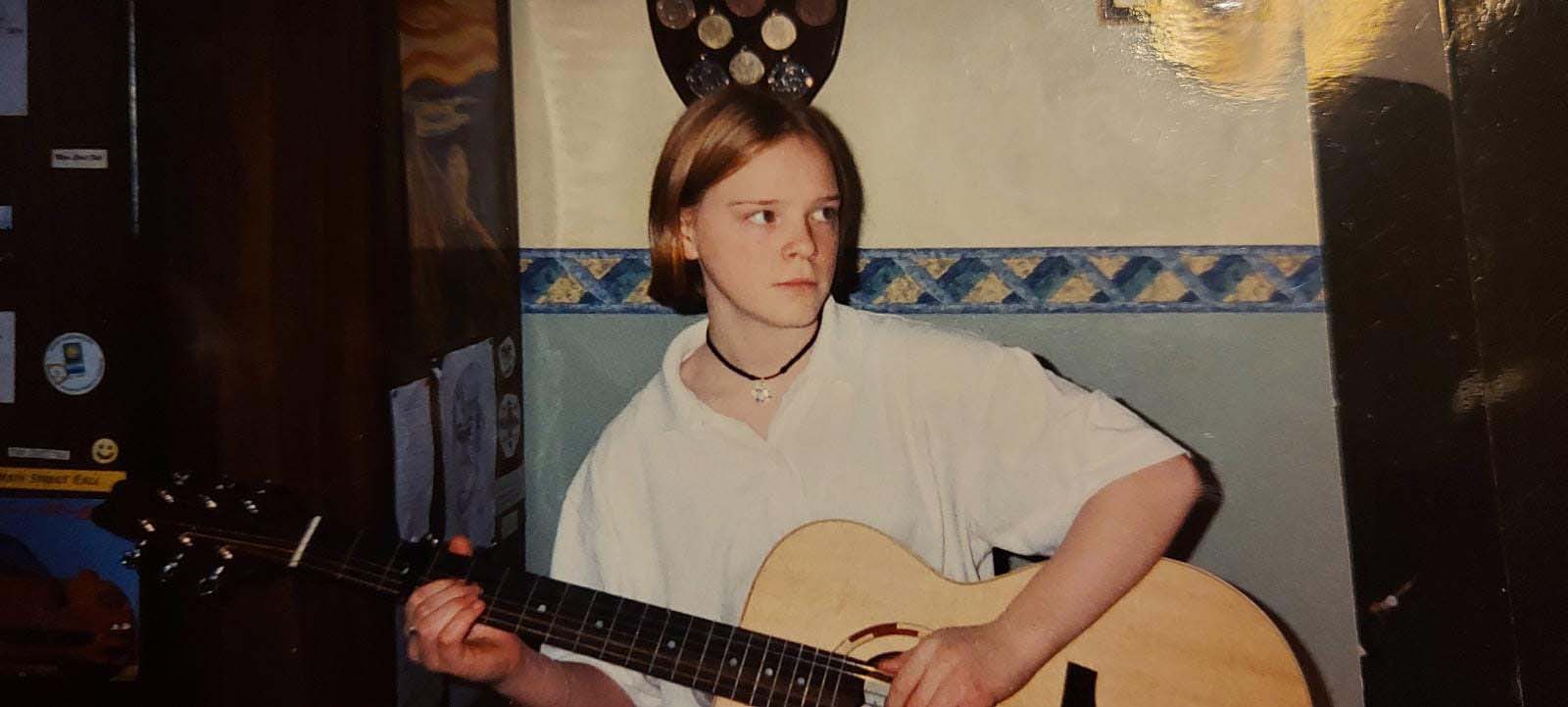 Wallis Bird performing when she was younger.
Wallis Bird performing when she was younger.NOT AN ATTENTION WHORE
She also has intentions for her music. Like herself, it is full of energy, and she takes it very seriously. She takes her craft very seriously. She°Øs ambitious. Wallis wants to leave a lasting impression.
She set up her own label to release her first EP Branches Untangle in Germany in 2006. She subsequently signed to Island Records and released her first album Spoons in 2007. Five more studio albums followed, along with years of gigging, and a well deserved reputation as a powerful and magnetic live performer. Along the way, Wallis picked up two Meteor Music Awards, including Best Irish Female in 2010.
She's just released her seventh album, Hands.
Does she ever listen back to her old stuff?
Advertisement
She does.
"To listen and see what I don’t want to do again,” she confesses, with a wry grin. “When I’m writing a new album I listen to the back catalogue with an uncritical eye. Sounds are feelings, sound is sequential emotion, and you bottle that – and sometimes you nail it. Your previous work always has something you didn’t know about yourself at the time. You look back and get the meaning a decade later. And it’s continuous. You never stop. You never stop creating.”
Having seen her live shows, I wonder if she writes the album, and then – once it's finished – starts to think about the show she wants to put together to showcase those songs. Or is she thinking about the live show from the beginning?
"That more so now than ever,” she nods. “This album was written specifically for stage, and for my audience who've followed me. But especially to get out of the [pandemic] funk of what we've been through for the last couple of years. So I designed the album around dance, dancing, expressing, using long-some notes, high rhythm. Cause I was sitting at home for a year during the pandemic, just doing nothing. And my body went into fucking rigour, and so in that way, I wrote the album just to get up.”
Job done, Wallis Bird! Hands is bursting with an infectious, raucous, "get up” (and at 'em) energy. But it also manages to be deeply personal – and that autobiographical slant is signposted the moment you pick it up. The cover art features a black and white picture of Wallis’ left hand. It takes a second before you register that there are only four fingers.
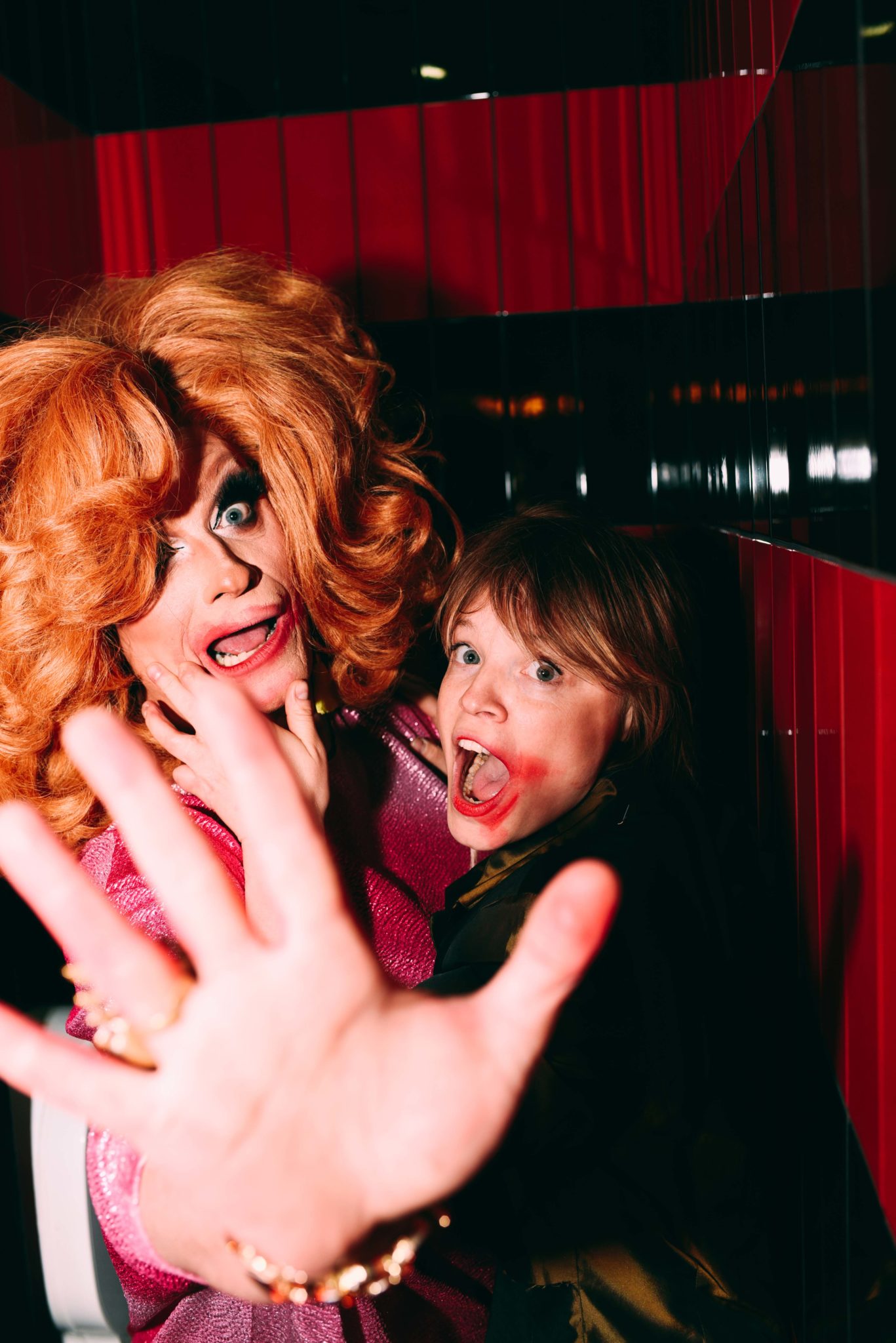 Wallis Bird and Panti Bliss. Copyright Miguel Ruiz.
Wallis Bird and Panti Bliss. Copyright Miguel Ruiz.Advertisement
The story of her life.
When she was just eighteen months old, the four fingers on her left hand were completely severed. "I fell under a lawnmower,” she says nonchalantly.
Her father was pushing the instrument of her fingers’ demise when it happened.
"He occasionally still feels bad about it,” she says. “He had to pick up my fingers from the grass and put them in his fucking hand and then drive to the hospital. Can you imagine? It's grand now cause I fucking love it, don't even think twice about it.”
I wouldn't normally examine the four-fingered hand of someone I've only just met, but in the interest of verisimilitude I do. Wallis Bird really isn't bothered. We are chatting in my dressing room (What? All gays have a dressing room!) and we end up putting our hands on the dressing room mirror and she traces the outline of mine with a lipstick, and I trace the outline of her’s.
The contrast is ridiculous. My giant five-fingered hand, and her tiny four-fingered one. Looking closely, I'm actually very impressed at what a good job they did in Navan hospital in 1984. Her hand is tiny now, so her fingers must have been minuscule when she was eighteen months old.
"Matchsticks,” she says. And yet they managed to reattach three of the four, and those three only look a little different. Were you slagged by kids in school or made to feel like an outsider?
Advertisement
"It never bothered me,” she reflects. “Other people's thoughts about me didn't bother me. That's just pure luck, something I was born with. It never bothered me, but something from it stuck with me – I liked the attention. I'm not an attention whore, but I do like it. I'm a performer!”
ZERO STARS OUT OF FIVE
Not caring what other people think is a very fortunate trait for any performer or artist to have.
"Yeah, maybe. But it's pure luck,” she repeats. “I mean, there's some practising in there of course. Dealing with bullying or repression is something you either take on desperately, or you kind of work on it. Sally Foran (aka DJ Sally Cinnamon, well known and much loved Dublin DJ) says, "You're not even remotely mortified are you?" and I'm like "Ah yeah – I think I was just kind of born that way’.”
What about criticism of her work? After all, we performers can be fairly precious about our output. We pour so much of ourselves into it that criticism can often seem very, and totally unnecessarily, personal.
"Oh God yeah! I got a review one time from an Irish journalist that said they wished they were deaf when they heard my music. And I thought: that's amazing. They gave me zero stars out of five! It was one of the broadsheets. And it was so outrageous, I put it in a frame, like fucking hell, wow… They wished they were deaf listening to it! And I thought that°Øs just golden, you couldn't make that up. So, I love critiques for that – because you can take what you want from it.”
I was looking for the drama: who was that tin-eared journalist? Disappointingly, Wallis Bird is too cool for drama. But then she°Øs had to face real life trauma head on. She°Øs always found people's reaction to her hand interesting.
Advertisement
"Because you don't know where that reaction is coming from,” she explains. “So instead of going, "Oh no they're talking about my hand’, I'd be like "Now I wonder why you reacted like that’. Funnily, when I started my career, there were a few comments like "How about the people in the first three rows? How do they feel about it?’And I'm like, "What?! The people in the first three rows?’ And they'd be like: "Cause they have to look at your deformed hand’. And I'm like "Excellent, I thought it was just because I spit a lot onstage.”
What about her guitar playing – did it affect that? It did. But Wallis Bird is very determined. She learned to play the guitar "upside down”.
"I just loved the instrument. And I remember my first teacher. He said to me: "Is it ok to hold it like that? Is that ok for your hand? Can you do that? Try this.’ He was really encouraging. So he was never like, "Oh Jesus, no don't, you won't be able to do that.’ And I loved the instrument, like it was my first teddy.”
Despite knowing from the beginning what she wanted the new album to sound like, the idea of calling it Hands didn't emerge till the end of the process.
"It's funny,” she reflects.”In fact, it only came at the very, very end. I kept avoiding it because I said "I'm not fucking gonna start using my hand-story as a story to sell an album". Cause I'm way too long in the tooth, I've had this for forty years and it doesn't even mean anything to me at this stage.
"But it was this idea of hands being so fucking private. If you take somebody's hand or look too closely at somebody's hand – I find them so private. And yet they're as expressive as your face.”
She's on a roll now.
Advertisement
"And then, when – during the pandemic – I thought ‘My career is down the Swanee, everybody's jobs are down the Swanee", I started turning to handcraft. Thinking, how can I actually be useful, or how can I do something else other than music? So I started to do things with my hands. I started making furniture and getting into woodwork. And then I got really into this documentary series called Hands. So good. Very special.”
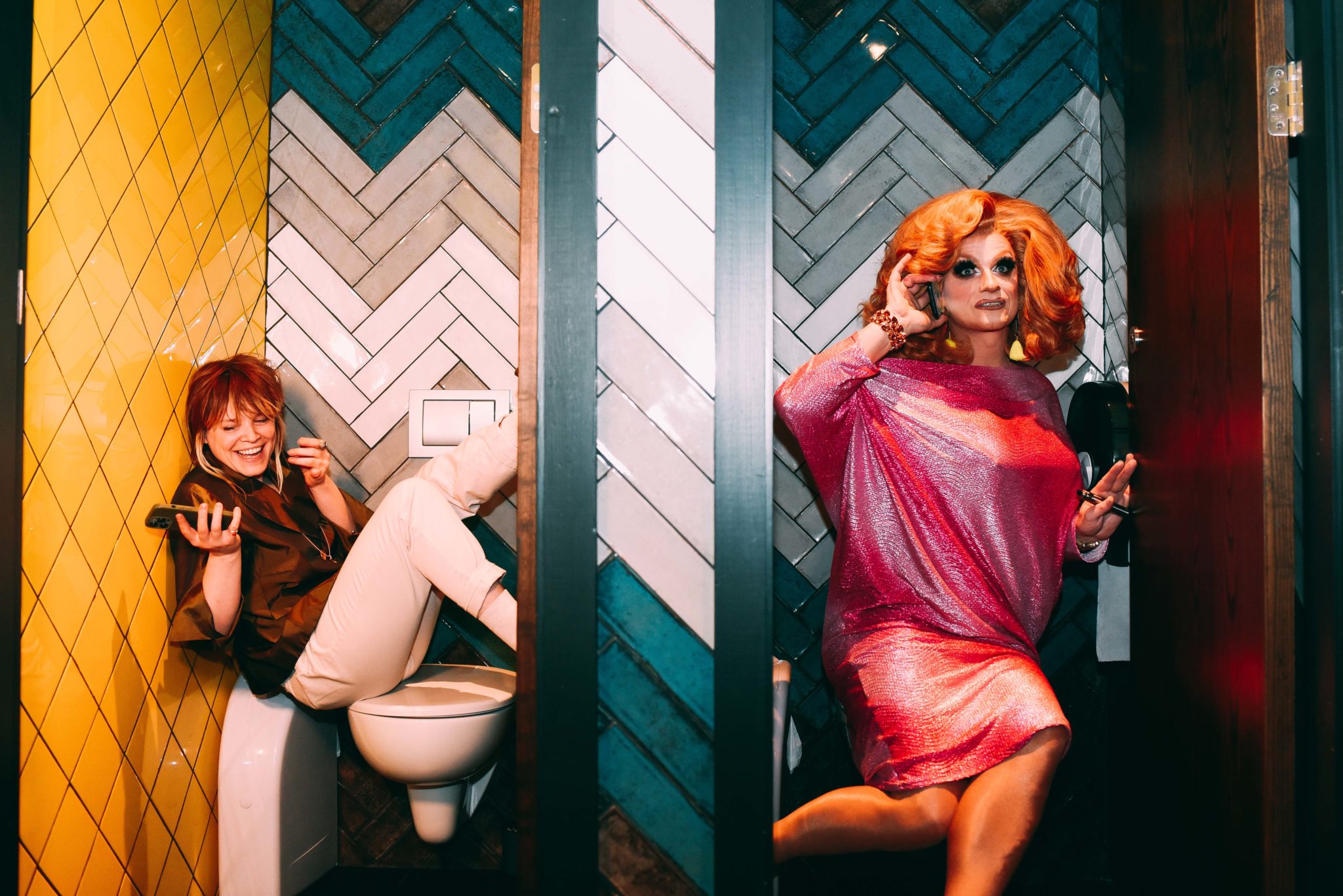 Wallis Bird and Panti Bliss. Copyright Miguel Ruiz.
Wallis Bird and Panti Bliss. Copyright Miguel Ruiz.Hands was an RTE documentary series, broadcast between 1978 and 1989, covering traditional Irish crafts. Made by David and Sally Shaw-Smith it really was special, creating what has been described as ‘a unique archive of life in Ireland at the end of the 20th century’.
"And of course hands were off limits during the pandemic. We weren't allowed to touch, to connect. I found that interesting, because of how much we use our hands to connect.”
There's a lyric on the album that comes from when she had her palm read. The man looked at her hand.
"He told me that my soul ends with me,” she says. "That was a turning point. It was an existential thing. I'd never heard it like that. I always thought, "Well I'm not going to have kids, I'm not going to have lineage, so what does a person leave behind actually?’”
Advertisement
A RADICAL EDGE TO QUEERNESS
I'd normally be somewhat trepidatious about asking a fiercely independent and singular female artist like Wallis Bird about not having children, but hey, she brought it up! So I plow ahead. Was that a conscious decision she made along the way?
"Yeah, it's like dropping this idea that a woman is a vessel,” she explains. “That came very late in life because I fucking adore kids. I'm going to do a lot with kids in my life. So that was a hard thing to say, like: ‘Ok, I'm putting my life to performance, and being there for other kids’.”
She thinks there's an "insane” amount of pressure on women to have kids and asks me if I've ever felt that pressure. Which I haven't, because until quite recently, just the idea that a gay man might have kids would have been seen as a very radical, off-limits kind of notion. Not any more. But it's always been different for women.
"It's that thing of… just being fucking asked is annoying,” she confides. “It's like, just don't ask any more. I like this idea of questions that would have been common place, like "Oh, are you having kids?’ And now we, as women, are allowed to say, "Would you stop asking me that stupid question?’”
Luckily for Wallis Bird her girlfriend Tracey agrees. They met in Berlin – but Tracey is from Kerry, so there were no big cultural differences to navigate. They were just friends at first, because – at the time – Wallis Bird was enjoying the Berlin party scene and Tracey was unconvinced that Wallis Bird was girlfriend material. But, as I've already said, Wallis Bird is a very determined person.
"I wouldn't have been the first choice to imagine a life with at the time,” she says candidly. “But I remember the first time I met her, I couldn't help but feel: "This person is extremely special. And I'm going to try and be in this person’s life and do right by them, rather than just attaching all of my bullshit onto their life. I thought: I really like the life that they have and I would like to somehow become part of that. We're together nine years now. And we were courting for about a year. I like the traditional shit.”
Advertisement
I mention to her that I sometimes feel that Irish queers have lost their radical edge and we all want to get married these days. My impression is that in Berlin there's still a radical edge to queerness.
Wallis has a theory that the Germans have entirely separated nakedness from sexuality. Which is a strange kind of aspiration – but it might just be true.
"They have dislocated sex from nakedness,” she says, “which is radical in itself, but it also kind of normalises and ‘boring-ises’ things a little bit. But the queer scene in Berlin is just so proud of itself. It takes great pride in being edgy and being in the edges of being an artist.”
I tell Wallis Bird that I quite like a little Catholic guilt with my sex because it makes it more exciting. It makes it feel a little sinful and dirty - in a good way!
Wallis Bird doesn’t disagree.
A lot of Irish artists have made the move to Berlin in recent years, which she puts down to a few things.
"Dublin is haemorrhaging artists. And then what do you have? You have a hotel city then. Whereas in Berlin, rent is cheap, you don’t have to work two or three jobs. You can spend your day thinking – because you don’t have to go to another job. And, of course, I went because I got the hot dinner. And that was a different form of respect than I’d ever been afforded in Ireland.”
Advertisement
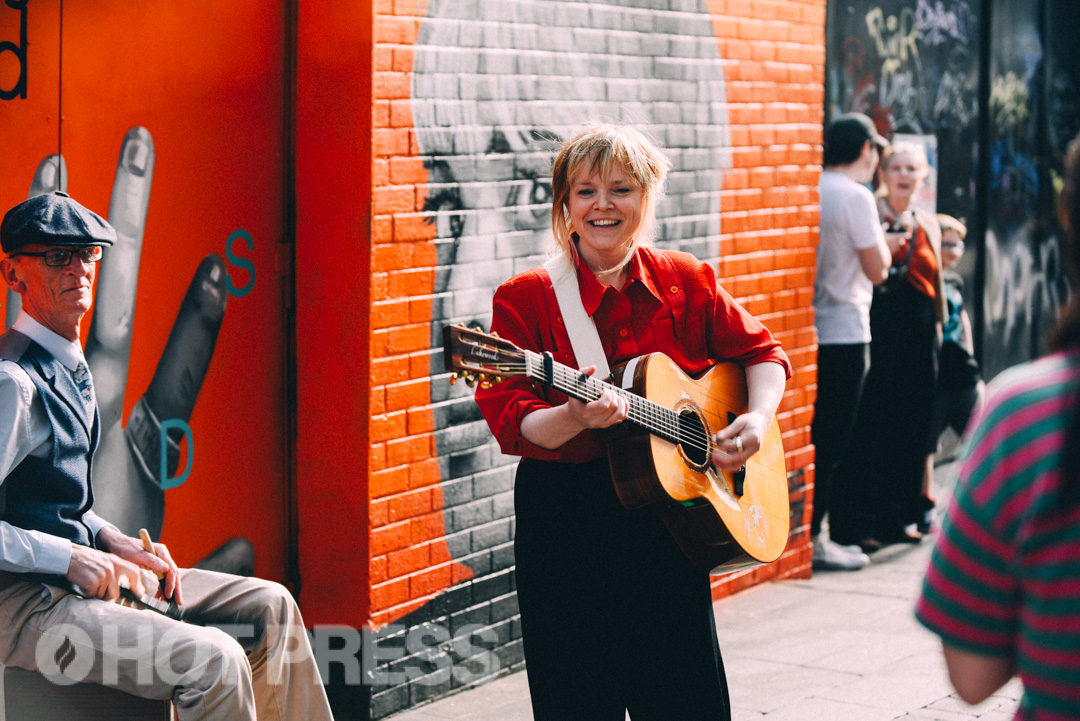 Wallis Bird busks in Dublin for the release of her album Hands. Friday 27th of May 2022. Copyright Miguel Ruiz.
Wallis Bird busks in Dublin for the release of her album Hands. Friday 27th of May 2022. Copyright Miguel Ruiz.A VIRGIN MARY VULVA
Berlin also afforded Wallis a kind of anonymity that she enjoys – the kind of anonymity that just isn't possible in the still small village atmosphere of Ireland. It helps that °∞Germany loves Irish artists, for some unknown reason which I still haven’t grasped.”
I wonder if she felt the lack of queer Irish female music icons when she was growing up in the 1990s? There wasn't really a trail that had been blazed that she could follow.
"Yeah,” she acknowledges, “I had to fill that space. I was happy to – they were mostly all hiding. And I said, 'A-Ok, I’ll be that.’ I’m proud to be, I’m very fully proud to be.”
Of course, now, we have Pillow Queens, which Wallis Bird thinks is "fucking brilliant!” She feels she was part of that evolution, opening the doors for other lesbian artists in Ireland – and she is right. But having been away so long, she doesn't particularly feel part of the Irish music scene right now – and often wishes she had spent more time in the country of her birth.
Advertisement
"Because I do have this wish to be well known,” she says. “For the performance to be seen.”
But she won't be returning to the Ould Sod on a permanent basis. That much is decided. She and Tracey have just bought a house outside Berlin, together with two other couples. One of her new housemates is a performance artist called Growler, whose stage persona is that of ‘an 81-year-old Virgin Mary vulva'. I can only point out to Wallis Bird that buying a house with an 81-year-old Virgin Mary vulva is the most Berlin lesbian artist thing I've ever heard!
I wonder what Mammy and Daddy in Enniscorthy think of having a Berlin lesbian musician daughter, leading the way for Irish LGBTQI+ artists in 2022?
"I imagine it's been awkward many times. But there was a point when I had no intention of hiding it, I just didn't see any rhyme or reason to it. Cause the result of that was like fucking suicide.
“But I always try and think about them when I'm talking,” she adds. “They would have said it's good to people and don't do things in halves. If you're going to do something do it fucking right, Wallis.’ So I took that in my own way, and they didn't really have a say unfortunately. But they set me on a good path.”
I can only agree. They set Wallis Bird on a good path – and she has made the most of it. I look forward to seeing where that path leads Wallis Bird from here.
In the meantime, it's all Hands on deck. Let's hope it is a monster…
• Wallis Bird’s latest album Hands is out now.










